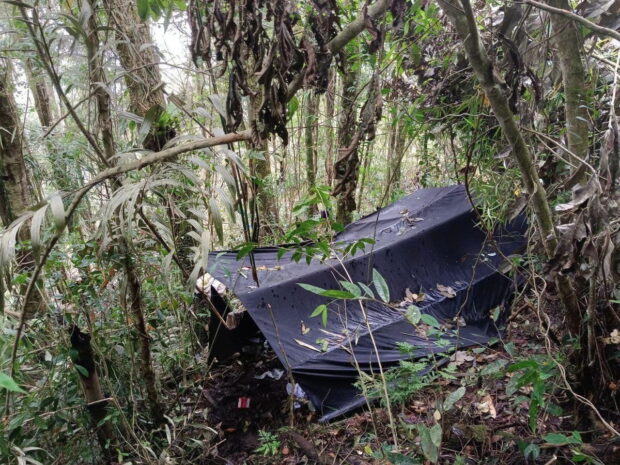
GUERRILLA SHELTER | Government troops find tents, one of them pictured here, abandoned by communist rebels following the Army’s Dec. 25, 2023, attack in the mountains of Barangay Canayan, Malaybalay City, Bukidnon. (Photo from the Philippine Army)
ILIGAN CITY, Lanao del Norte, Philippines — While still sharply critical of President Ferdinand Marcos Jr., the Communist Party of the Philippines (CPP) said it was looking forward to political negotiations with the government on the basis of previous agreements while affirming the primacy of “waging armed struggle as the principal form of struggle” for national change.
“… The opportunity to engage in peace negotiations [is] an additional battlefield to advance the national democratic cause as the basis for a just and lasting peace,” the CPP said in a statement on Tuesday, its 55th founding anniversary.
“The NDFP negotiating panel will continue to strive to push the resumption of peace negotiations on the basis of previous agreements,” it added, referring to its political arm, the National Democratic Front of the Philippines.
The NDFP will “push for the recognition of all previous agreements, including The Hague Joint Declaration, the Joint Agreement on Safety and Immunity Guarantees, and the Comprehensive Agreement on Respect for Human Rights and International Humanitarian Law,” the party added.
On Nov. 23, six years after then-President Rodrigo Duterte scrapped the peace talks, government representatives met with several CPP leaders in Oslo under the auspices of the Norwegian government and later issued a joint communique setting the stage for the revival of the peace process.
Christmas attack
“The parties agree to a principled and peaceful resolution of the armed conflict. Resolving the roots of the armed conflict and ending the armed struggle shall pave the way for the transformation of the CPP-NPA (New People’s Army)-NDFP,” the statement said.
But the CPP on Tuesday said it was wary of government efforts “to employ the talks to cause the capitulation of the revolutionary movement.”
The CPP noted that military operations against the NPA, its armed wing, continued even with the Marcos administration “now dangling its amnesty proclamation and preliminary efforts of reviving peace negotiations to inveigle the Red fighters of the NPA to capitulate.”
A day before the CPP anniversary, the Army launched a Christmas Day attack on a rebel camp in Malaybalay City, Bukidnon. The military said 10 NPA guerrillas were killed in the firefight. The attack was launched three hours after the unilateral two-day truce declared by the NPA took effect, a move that was not reciprocated by the government.
According to Brig. Gen. Michele Anayron Jr., commander of the Army’s 403rd Infantry Brigade, the attack was carried out while the local communist forces were still preparing for what was expected to be a major CPP gathering.
Tech-aided warfare
The timing was deliberate supposedly to reduce the chances of hitting civilians who were invited to attend the event.
Anayron said the soldiers had been pursuing the rebels since the NPA torched some harvesting equipment on Dec. 1.
Monday’s attack used advanced warfare technology, such as an Israeli-made truck-mounted howitzer aided by heat-seeking drones for precision strikes.
Also seeing action was a Brazilian-made Super Tucano aircraft, which unloaded 250-pound bombs on rebel positions that were known to be strewn with landmines.
‘Shallow analysis’
Also in its anniversary statement, the CPP admitted to “crucial errors, weaknesses and shortcomings in the ideological, political and organizational fields…”
“We must point these out in order that we can firmly rectify them and pull out their subjectivist roots,” the party said.
The CPP noted that its cadres lacked the initiative to keep tabs on changing social conditions, resulting in a “shallow analysis of issues,” as well as a “tendency to put one-sided emphasis on the struggle for reforms under the ruling reactionary government.”
These errors, according to the party, had led to the NPA being “self-constricted to its guerrilla base area and mountain encampments,” limiting its ability to go on the offensive.
The party called on members to “rectify” these errors, maintaining that the social condition was ripe for revolution.
The CPP also criticized President Marcos for allowing his administration “to be used as a pawn in the aggressive push of the United States to consolidate its hegemony in the Philippines and the Asia-Pacific region, in order to counter the military and economic growth of its imperialist rival China.”“Under Marcos, the Philippines is increasingly being dragged into the vortex of the rising military conflict between the US and China,” it said.
Tribute to Joma
The CPP also paid tribute to its founding chair, the late Jose Maria Sison, or Ka Joma, calling him an “inexhaustible beacon.”
“The passing away of Ka Joma (in December 2022) and the death of some of our key leaders are a profound loss to the Party’s central leadership,” it said.
“The Party, however, is fully conscious of how it was established with the great task of leading the Filipino people’s democratic revolution and future socialist revolution that goes beyond the lifetime of any one person, and way beyond the capacity of a few people to perform,” the CPP said.

